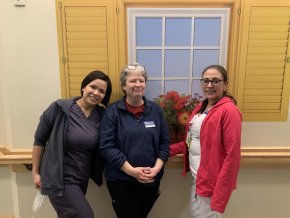
How behavioural support experts personalize care for residents living with dementia
TweetAt Extendicare McGarrell Place in London, Ontario, a dedicated trio lead as the Behavioural Support Ontario (BSO) experts in the home’s Behavioural Support Transitional Unit (BSTU), which is specifically designed for residents living with dementia and complex behavioural needs to help enhance their quality of life.
Karissa, a Registered Practical Nurse, Luisa, a Registered Nurse, and Kerry, a Personal Support Worker, share how their BSO team leads compassionate, person-centred dementia care by building rapport with residents and families to support the transition into and out of the specialized unit, and why they say their roles are so rewarding.
Q: What is the role of the BSO team in the BSTU at McGarrell Place?
Luisa: Our role goes beyond traditional care. We provide consultation, assessment, and personalized care planning to help new residents and their families transition into the care home environment. We focus on understanding residents as individuals, not just their medical conditions.
Q: How does working in the BSTU as a BSO team member differ from other long-term care experiences you have had?
Karissa: I’ve been at McGarrell Place for 15 years, and in my role in the BSTU since it opened. The BSTU allows us to develop deeper connections with residents and tailor care approaches to their unique needs. We work closely as a team to ensure the best outcomes.
Kerry: As a BSO Personal Support Worker, I get to spend more one-on-one time with residents. This extra time is beneficial for both residents and caregivers, allowing us to better understand their needs and preferences.
Q: How does the team approach person-centred dementia care?
Luisa: My goal is to see the resident as a person first. We take time to learn about their history, behaviours, and preferences to create care strategies that improve their quality of life.
Karissa: We also involve families in this process. Their insights help us build trust and establish effective care plans that are truly personalized.
Q: Can you share an example of how the BSO team provided personalized care?
Karissa: One resident came to us experiencing significant physical agitation and restlessness. Through collaboration with medical consultants and caregivers, we discovered that a specific type of headband helped provide comfort and distraction. By carefully testing different materials, we found a solution that reduced their anxiety. Over time, as their agitation decreased, we built trust and were able to reconnect them with their family, helping them transition successfully to a new care setting.
Q: How does the team support families during the transition process?
Luisa: Many families feel overwhelmed. We build strong rapport with them, provide emotional support, and offer transparency about their loved one’s care. We also connect them with resources like social workers and the McGarrell Place Family Council.
Karissa: We make sure families feel heard, just like the residents. Dementia care is a journey, and we want them to know they’re not alone.
Q: What role does teamwork play in the success of the BSTU?
Kerry: Our team fosters meaningful connections between residents, their loved ones, and caregivers. We work together to address concerns, update care plans, and provide on-the-spot training to support our colleagues.
Luisa: We also lead daily meetings to ensure consistency in care. Communication is key in our interdisciplinary approach.
Q: What happens when a resident is ready to transition out of the BSTU?
Luisa: Each resident has unique goals, and their transition is carefully planned. We provide new caregivers with detailed histories of successful interventions and follow up virtually to support stability.
Karissa: It’s always bittersweet when a resident transitions, but we know we’ve done everything possible to prepare them for their next stage of care.
Q: What advice do you have for families of loved ones with dementia?
Luisa: You need to take care of yourself first in order to care for someone else. Self-care is essential.
Karissa: Look beyond the disease and see the person. Understanding who they were and who they still are is key to providing meaningful support.
Q: What is the most rewarding part of your work?
Kerry: Seeing residents improve and form connections with their loved ones again.
Luisa: Creating a home-like environment where residents feel safe and happy.
Karissa: Knowing we make a difference in people’s lives every day.
